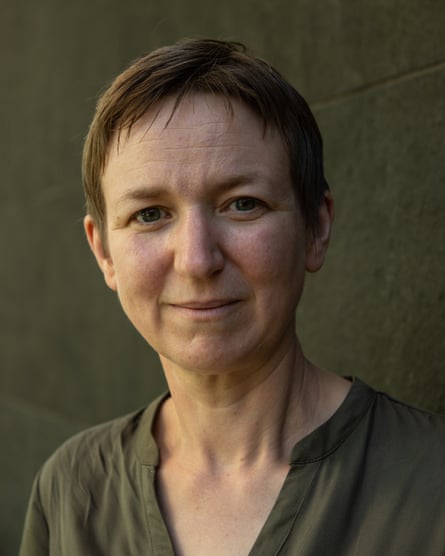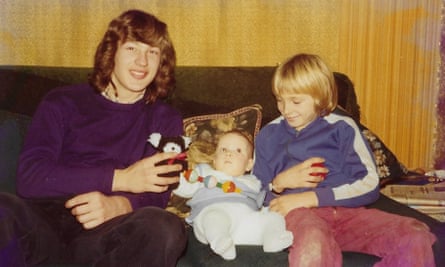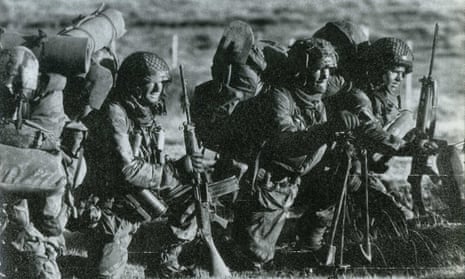On the morning of 28 May 1982, Lt Col Herbert “H” Jones was killed leading his men over a ridge in what was to be one of the decisive confrontations of the Falklands war. He was one of 17 British soldiers to lose their lives in the two-day battle of Goose Green, along with about 50 Argentinians, but his was the derring-do that caught the public imagination and would be posthumously rewarded with one of the conflict’s two Victoria Crosses.
Hours earlier, in the freezing darkness, a 19-year-old soldier in Jones’s parachute battalion had a narrow escape when a bullet deflected by his water bottle came to rest in his navel. Badly shocked and bruised, Pte Dave Parr was helicoptered to a field hospital. Usually, a hospital admission would have meant the end of his war, but after it was discovered that the shell hadn’t pierced his skin, he asked to be released back into battle. Just over a fortnight later, he was hit a second time – this time fatally.
Helen Parr was seven years old and ill in bed when the phone rang with news of her uncle Dave’s death. She remembers her mother running up the stairs in tears and her father rushing off to comfort her grandparents. Seven months later, the family gathered for his funeral in the Suffolk village where Dave and his two brothers had grown up. “People were lining the route. We were behind this huge gun carriage and my uncle’s coffin, draped with the union flag. There was this gun salute and men crying as they ceremonially lowered the coffin into the ground,” she recalls. “In a way I always knew I wanted to write something about the Falklands, but I didn’t know what it would be.”
The book that has emerged nearly four decades later is a vivid history whose title – Our Boys – boldly echoes Margaret Thatcher’s mumsy rhetoric while inflecting it through the unflinching testimony of soldiers and their families. Why revisit it now? “It is such a symbolic war,” she says. “Now the political dimensions have faded a bit, the cold war is over and Britain finds itself in a different world position, its legacy is more of an emotional and social one than we would have seen at the time. It was a really old-fashioned war, but it was also the beginning of the contemporary era.”
Dave was a member of the Parachute Regiment, which had been set up by Winston Churchill during the second world war as an elite force with a mission to attack from the air behind enemy lines. Field Marshal Montgomery, who ordered them into the disastrous Battle of Arnhem in 1944 – in which 1,400 paras died and more than 6,000 were taken prisoner – hailed them as “men apart, every man an emperor”; subsequent commentators were less complimentary, even going so far as to label them “uniformed psychopaths”.
The aggression and fearlessless that made them war heroes were qualities ill-suited to keeping the peace, in what Parr describes as “the morally difficult and defensive” postwar world. Their record arguably reached its nadir on 30 January 1972, when soldiers from their ranks shot and killed 13 civilians in Londonderry on what was to become known as Bloody Sunday.
By the end of the 1970s, they were a fighting force badly in need of a reputational makeover. Then along came the Falklands war, which turned their fortunes around with its widely published images of men carrying heavy guns and equipment across rugged terrain in terrible weather. “The land battles were iconic because for the first time in a generation British soldiers engaged a static enemy on open fields and ridges,” says Parr. “They were intense, fought at night at close quarters, sometimes hand to hand with bayonets.”

As a lecturer in international relations and politics, who had been raised on Wilfred Owen and Apocalypse Now and whose only previous book was a history of Britain’s relationship with the European Union in the 1960s, Parr was uncertain what to make of the men who had fought alongside her uncle. It took a visit to the Falklands in 2012 – accompanying her father for the 30th anniversary commemoration of the war – to set her on a mission to find out more about them.
Dave had been the youngest of three brothers – the one who wasn’t an academic success. Like many recruits, he was keen to escape a low-paid life for a career that the recruiting adverts promised would involve fitness and friendship, sun and sea. Many of his comrades came from northern industrial towns. “Their aim wasn’t to escape unemployment – at the time there was an assumption that full male employment would continue – but a lot of them had failed school and they didn’t want to go down the pit. It was certainly the case that they didn’t expect war,” says Parr.
Her research, at the Airborne Assault museum in Duxford, backed up anecdotal evidence that “a sizeable minority had grown up in deprivation and domestic chaos”. Records revealed a number who had spent their childhoods in children’s homes or had joined to escape detention for crimes ranging from football hooliganism to assault and criminal damage. One son of an RAF technician had turned to burglary to help make ends meet after his parents divorced. On the voyage out to the Falklands, paratroopers were recorded to have stolen four irons, three watches, 45 salt cellars and 1,100 spoons.
Why did so many young tearaways decide to join up? “It could be that fighting on the streets and football terraces made a job in the paras look attractive. It could also be that men facing detention were given the choice of the army as an alternative to a prison sentence,” Parr writes.
Thirty years on, she found many were not only willing but keen to talk. As well as the men, her 60 interviewees include their friends and families, whose stories trace a familiar pattern of lives for ever altered by trauma and loss. “My grandmother’s house was a shrine to Dave,” she says. “In some ways, she was ashamed of what had happened to her and she seemed to believe that Dave’s death was punishment for her sins.”
Post-traumatic stress disorder had yet to be recognised as anything more than temporary “battle shock”. Yet a friend who was standing next to Dave when he died described acting out his survivor’s guilt for more than 20 years – waking every night to brew a cup of tea for his dead comrade, which they would drink together, “laughing loudly, so loud that at times, when my children were staying with me, they would get up and ask what I was doing”.
The book’s blistering central section gives a no-holds-barred account of the battles, and includes an attempt to reconstruct the circumstances of Dave’s death. One soldier assures her there was no blood; another tells her he was decapitated. Which does she believe? “The latter,” she says. “One of the things I hope is powerful about my approach is that it demonstrates that you have to accept that you can’t always know what happened: even people who were very near to each other have different perceptions.” Soldiers want to shield relatives from grisly details, while families often don’t want to know.

One of the hardest truths her own family had to face was only revealed a year after Dave’s death, when his regimental commander turned up for a second time on her grandmother’s doorstep. In his original letter of condolence, Maj Philip Neame had written that the company “‘were under very heavy artillery fire ... and it was this that killed him”. His follow-up visit was to inform them that Pte Dave Parr had been killed by a shell from his own side – as was about to be revealed in one of the first accounts of the war by a retired general who had been unaware that the family didn’t know.
“For my father and uncle, and my grandparents, the news was a shock [which] added to the devastation already caused by his death, but I do not think that it made them more aggrieved,” writes Parr. “He was unlucky,” she says now. “But in the confusion of battle it was lucky that more soldiers didn’t die like that.”
On their visit to the Falklands, Parr and her father tried to retrace Dave’s final steps and built a cairn of stones in his memory. “It’s really remote and wild, and even in spring there was so much wind,” she recalls. “But I didn’t feel as much connection as I thought I would, which illustrated for me that I’m at one remove.”
Her task, as a historian rather than a bereaved relative, was to make a faithful record, robust and detailed enough to withstand all the inevitable gaps and contradictions. “The details are the difference between life and death,” she says. “Between being the one who was standing in the way of the shell and the one who has to live with the knowledge that he wasn’t.”
Our Boys is published on 27 September by Allen Lane, £20. To order a copy for £17, go to guardianbookshop.com or call 0330 333 6846

Comments (…)
Sign in or create your Guardian account to join the discussion